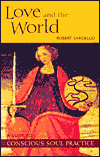
In college I majored in psychology, hoping to gain insight into the occasionally random behaviors people exhibit. One of my favorite teachers began her first lecture by telling us that the study of psychology began as the desire to understand the human soul. That piece of knowledge has been long lost and buried under notions of sexuality and the delineation of specific behaviors as positive or negative. Rare it is to find a psychologist who speaks lovingly of the soul. Until now. As a practicing psychotherapist for more than 20 years, Robert Sardello has explored the lineaments of what he calls "spiritual psychology." This is "an active practice that develops embodied, conscious, soul life to make that life open and receptive to the spiritual realms. This is done as an act of love toward ourselves, others, and the world." A simple statement, yes, but one that the author spent eight years formulating, and summarizes the book perfectly. Sardello’s great talent, perhaps his genius, is to penetrate the wisdom of the ancients, weave it into the precepts of new thinkers and present us with practical, spiritual tools that are both timeless and carefully forged for this moment. At the same time, he makes it clear that there is no easy fix. Spiritual psychology is nourished by imagination, the legendary tales of the Grail, and the writings of Rudolf Steiner. Sardello argues eloquently that the egotism that separates us from others leads to paranoia, anger, addiction, boredom, and a fear of encountering the future. It is also what is behind attitudes that regard the world as a dangerous and doomed place. In contrast, treating the world with disrespect is an act of treason. Care of the soul must lead naturally to care for the world. The primary expression of the world soul in mythology is seen in many cultures as the tale of the spiritual being called Sophia (also called Isis). She is archetypal wisdom, the world as imagination, the world coming to be. What is felt now, in the new millennium, as an emerging, urgent turning toward soul is, Sardello contends, preparation for a Sophianic world. It is time, he writes, to realize our capacities as creators in the world who are neither plagued by a sense of separateness nor motivated by a hungry ego. “We have for too long now confined the notion of soul to the interior of the human being, leaving the world to the exploitation of need and greed. If there is no soul in the world, then the notion of the human being as having soul is nothing more than pious abstraction and bad theory.” Sardello effectively argues for a reuniting of art, science and religion. Throughout the book he repeatedly calls for psychology to be re-imagined toward what is coming to be rather than what has passed. He reasons that people enter therapy to find a new way of being and that on a daily basis we meet the world not only with what lives from the past but also with an intuition of what is coming. Helpful distinctions and connections are made between individual and universal aspects of love, soul, and self. “True self-love is an activity without an object…living individuality is living ever increasingly into the world with immediate perception uncategorized by concepts from the past; it follows that loving is the same as being ever more aware of the world as activity in which the I is engaged.” A chapter devoted to grief as the activation of conscious soul life shows a masterful understanding of the etheric body and its relationship to the physical body, the ego, to all of humanity and the living being of Earth. Subsequent chapters illustrate that the heart is an organ of perception, discuss soulful relationships, and introduce a way of working with dreams that emphasizes not content but the creative dreaming consciousness. "Psychology, I want to claim, is more than the study of the human soul. It is not possible to make such a study without the student undergoing inner changes in the process. Psychology, since it is we who study it, necessarily requires that the psyche be utilized to study the psyche. It therefore belongs inherently to the realm of practice. It is not a theory wandering around seeking application. We must do our psychology rather than theorize about the soul. And the doing of psychology is the doing of love-consciously, actively, and for the sake of others and the world. If you enter into the interior of these words, your soul will awaken, and begin to move in this direction. It follows, too, that this is not only a book about psychology, it is also the very speech of psyche itself." -Robert Sardello, from the Introduction Words are powerful entities. Sometimes they are mirrors that capture time and being; other times they are the beholders of wisdom, magic, and beauty; and, at still other times, they transform and create the world. In the book Love and the World, words facilitate a deep transformation: they touch the innermost part of the self, turning it into consciousness and creating a new way of perceiving ourselves and everything and everyone around us. ~review by Lisa Mc Sherryby Robert SardelloLindisfarne Books, 2001
